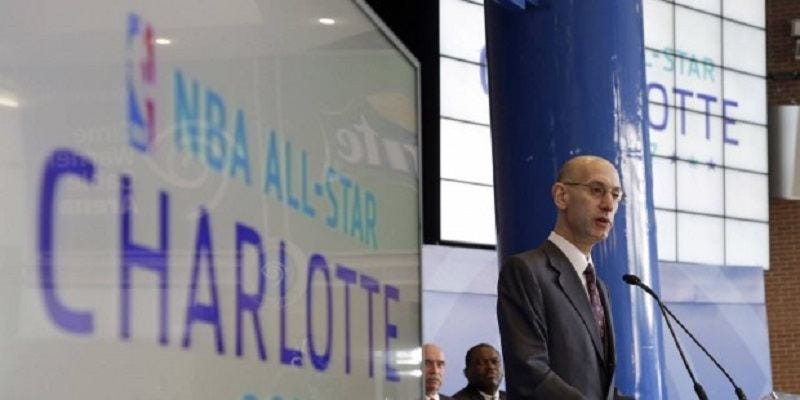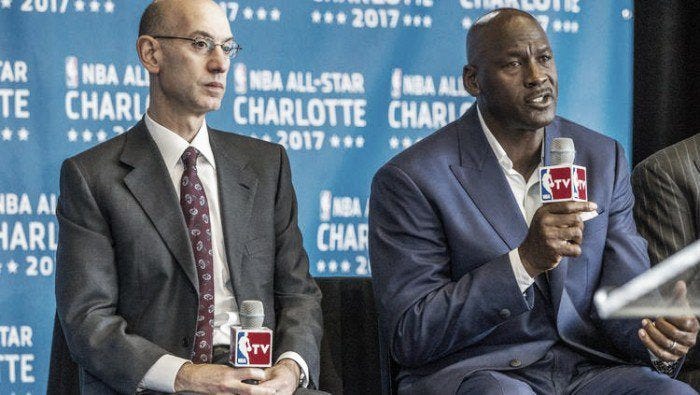Charlotte’s anti-LGBT law drives NBA All-Star Game out
Click to read the full story: Charlotte’s anti-LGBT law drives NBA All-Star Game out

You wonder how much more of a financial hit Charlotte, NC has to take before it realizes that it’s antiquated anti-LGBT laws aren’t going over with many Americans, including the NBA.
The NBA is moving the 2017 All-Star Game out of Charlotte because of its objections to a North Carolina law that limits anti-discrimination protections for lesbian, gay and transgender people.
The league had expressed its opposition to the law known as HB2 since it was enacted in March, and its decision Thursday came less than a month after state legislators revisited the law and chose to leave it largely unchanged.
“While we recognize that the NBA cannot choose the law in every city, state, and country in which we do business, we do not believe we can successfully host our All-Star festivities in Charlotte in the climate created by HB2,” the league said in a statement.
The league added that it hoped to announce a new location for next February’s events shortly. It hopes to reschedule the 2019 game for Charlotte if there is a resolution to the matter.
“We understand the NBA’s decision and the challenges around holding the NBA All-Star Game in Charlotte this season. There was an exhaustive effort from all parties to keep the event in Charlotte, and we are disappointed we were unable to do so,” Hornets chairman and Hall of Famer Michael Jordan said. “With that said, we are pleased that the NBA opened the door for Charlotte to host All-Star weekend again as soon as an opportunity was available in 2019.”
The league’s decision was first reported by the Vertical.

During its yearly work session that ended on July 1, the General Assembly restored the ability of workers to use state law to sue over employment discrimination on the basis of race, religion and other factors — but left gender identity and sexual orientation unprotected.
There was no appetite among Republican lawmakers to change the provision requiring transgender people to use restrooms corresponding to the sex on their birth certificates in many public buildings — a measure at the heart of two legal challenges in federal court.
The law passed in a March special session also excludes sexual orientation and gender identity from antidiscrimination protections related to the workplace, hotels and restaurants; and overrules local antidiscrimination ordinances. Republican leaders have said the law was passed in response to a Charlotte ordinance that would have allowed transgender people to use restrooms consistent with their gender identity.
The fate of the state law is likely to be decided in federal courts where dueling lawsuits are being heard, with a judge saying he wants to start the trial in four of the five cases by early November. He’s also set an August 1 hearing on a motion for a preliminary injunction to block the law’s bathroom access provision.
Charlotte officials have said they expected the event to have an economic impact of around $100 million, based on data from recent All-Star games in the comparable New Orleans and Orlando markets. The game could rival the $164 million economic impact of the 2012 Democratic National Convention in Charlotte, the largest financial bump of any event for the city.
Jordan vowed to restore interest in the Hornets when he took over as the franchise’s majority owner in 2010. He had hoped that hosting All-Star game would be another step in putting the franchise back on the map.
“It’s a constant process to get back to the top,” Jordan said on June 23, 2015, at a ceremony in downtown Charlotte. “At one point this team was on top. And we took a long fall.”
The Hornets have fought through some tough seasons — including a 7-59 campaign — but have been to the playoffs twice in the past three seasons although they have not advanced out of the first round.
NBA Commissioner Adam Silver has said having Jordan, one of the NBA’s most recognized figures, in Charlotte was one of the draws for the league to have the All-Star Game in Charlotte.
“I give him an ‘A’ for all of the things that he is doing in the community,” Silver said. “We wouldn’t be bringing an All-Star Game to Charlotte if we didn’t think he was an A-level performer regarding management of a franchise.”
When the Hornets submitted their All-Star bid, the city had agreed to pay about $30 million in renovations to the arena. Silver had said he was pleased with the Hornets plans that had been made for renovations, which included upgrading the infrastructure, suites and scoreboard — all of which have been completed or are close to being completed.
On Thursday, Jordan thanked city leaders for their support.
“We want to thank the City of Charlotte and the business community for their backing throughout this entire process, starting with the initial bid,” Jordan said. “We are confident that they will be just as supportive and enthusiastic for the 2019 NBA All-Star Game.”
The post Charlotte’s anti-LGBT law drives NBA All-Star Game out appeared first on Movie TV Tech Geeks News By: Jackie Warner


